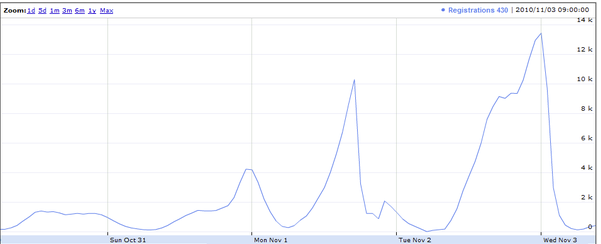2011 is the year for us to find some winners and to make them explode on to the international scene. 2011 is the year for Canada to pull out of the pit and to hit the track hard. It is going to get a bit crazy and you have to decide for yourself whether that is a good thing or not.
2011 is the year we capitalize on some of the hustle of the last 3 years and when we all focus on building some huge successes.
For a lot of people 2011 is the year of winning big.
Economic indicators continue to suck, but it doesn’t seem like anyone cares. Competition is heating up and everyone is ready for a good brawl. Year of gluttony. Present company excepted of course.
Howard is going to Russia. As an EIR I have been practicing sitting back in my chair, putting my hands behind my head and saying “What’s your China strategy??” (that’s a joke BTW)
The IPO market will not be back in 2011 though. Frankly, I don’t care.
You are going to hear less editorial from us at StartupNorth in 2011 because we are going to be focused on the big wins. I am putting my money and time to work in startups that I think are going to KILL IT. Where are you focusing on 2011?
2011 isn’t about kumbaya for me. It’s about making the best of a good time. We live in good times. I’m not throwing the baby out with the bathwater, but I want to see the baby put to work.
This is the year to take your shot. Either exit or go big
 Opportunities in 2011 will be outsized compared to what we have seen and may be better than we will see again for another five years.
Opportunities in 2011 will be outsized compared to what we have seen and may be better than we will see again for another five years.
The bears are all tired and the bulls will be back to buying. The “early exits” and “talent acquisitions” we have seen in the last 18 months will continue, but we will also be back to some really big opportunities.
This is the year to take that leap.
Whether you’ve been working on an OK business that needs scale, or you have a killer founding team ready to come together to attack a huge market, then this is the time to gather resources and to really focus on making it happen.
Can you do it in Canada? Good teams are going to get funded. Good teams and big ideas. Before you start worrying about your idea, think about your team and how you are going to execute.
This is the year to try that big idea.
Whatever you are passionate about, 2011 is the year when people with big ideas will finally be listened to again. No more “that will never work” — it’s going to be optimism and opportunity. People are ready to listen to visionaries again and we need them. Whether it is social change, a new startup or a research project — this is your time to roll.
If you have been sitting on the sidelines then it is time to get off your butt and make your move. Now or never.
Losers will be lost
For some reason people always think that it is the losers that win in “good times”. That’s a load of crap. Bad companies will always be bad companies. They aren’t going to get any further ahead in 2011.
Focus is still the name of the game
Smart entrepreneurs will not be focused on valuations they are going to be focused on working with winners, because the wannabes are going to be coming out of the woodwork. Smart VCs will double down on the markets that they know well. This is not the year to spread yourself thin looking for the next sexy deal, it’s the year to double down on deals you understand and that you can ride right to the end.
Canadian funds need to avoid being used as “runway” in later stage US deals. DIG IN and focus on taking good opportunities from Seed to Exit. Making things is still worth more than buying things.
I normally hate predictions, resolutions and anything “year end”, but this time I am too optimistic to hold it back. I am already waving goodbye to 2010 and as far as I am concerned it is 2011 already.

 Some great news for Ontario, and the national startup community, today. We are hearing from multiple sources that John Ruffolo will be joining
Some great news for Ontario, and the national startup community, today. We are hearing from multiple sources that John Ruffolo will be joining 


